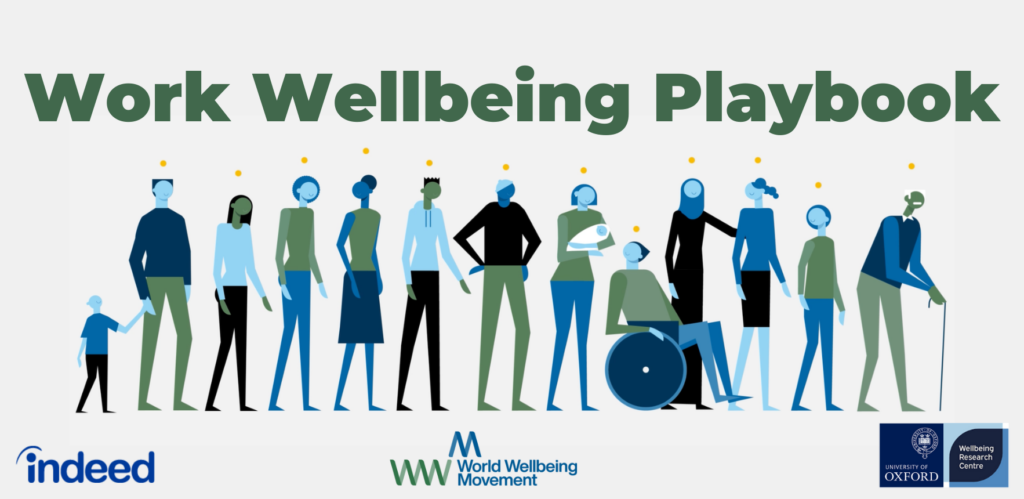05.03.2024 | 4 min read
Making work better: Recommendations of large-scale review of workplace wellbeing strategies made public
A new Work Wellbeing Playbook, created in partnership between the World Wellbeing Movement and Indeed, is released as open access today.• A new Work Wellbeing Playbook, created in partnership between the World Wellbeing Movement and Indeed, is released as open access today (Tuesday)
• Researchers at the University of Oxford’s Wellbeing Research Centre reviewed more than 3,000 studies of workplace wellbeing interventions to identify proven strategies
• High-level review of research-informed insights summarised in accessible plain English resource for busy business leaders seeking to develop holistic work wellbeing strategies
Experts in the research of workplace wellbeing have today (Tuesday 5 March) published a new playbook of proven strategies to make work better for employees and employers alike.
The Work Wellbeing Playbook was created in collaboration between not-for-profit social impact organisation the World Wellbeing Movement and recruitment company Indeed.
Researchers from the University of Oxford’s Wellbeing Research Centre reviewed more than 3,000 academic studies of workplace wellbeing interventions to identify strategies proven to increase the wellbeing of employees across diverse work environments. They then distilled the key insights into an accessible, high-level summary to support busy business leaders.
The Work Wellbeing Playbook builds upon Indeed’s Work Wellbeing Score – the world’s largest study of workplace wellbeing – also created alongside experts from the Wellbeing Research Centre.
The summary resource is available as open access: meaning business leaders can view resources collated by the research team free-of-charge, and select interventions best suited to improving the drivers of wellbeing in their organisation.
Business leaders are recommended to keep diversity top of mind when leveraging the playbook to craft a comprehensive employee wellbeing strategy for their organisation. When choosing interventions, employers should consider factors such as their workplace environment, industry, geographical location, and the unique needs of their employees.
There is no one-size-fits-all solution to improving workplace wellbeing
Sarah Cunningham, Managing Director of the World Wellbeing Movement and a co-author of the Work Wellbeing Playbook, said: “While the downsides of poor workplace wellbeing to both employees and their employers have sadly been well-documented, we are also now starting to establish a better picture of the positive impact of strong workplace wellbeing.
“But employers need to take a holistic approach if they want their wellbeing strategies to actually translate into improved employee wellbeing. And now, thanks to our collaboration with both the Wellbeing Research Centre at the University of Oxford, and the recruitment company, Indeed, we are able to provide organisations with the tools to achieve just that.
“Employers, though, should be under no illusion: there is no one-size-fits-all solution to improving workplace wellbeing. Each organisation must develop their own unique ‘menu’ of resources based on their unique employee needs and environment.
“Although there is no magic formula, and all interventions have their limitations, many companies start to affect positive change when they combine multiple interventions (organisational-level interventions, group-level interventions and individual-level interventions) across multiple drivers of employee wellbeing.”
Wellbeing can no longer be an afterthought in the workplace
“Wellbeing can no longer be an afterthought in the workplace. Some of us have part-time gigs, some of us work 40 hours a week at work, and some of us spend much more. It is imperative that employers understand the ways in which they can empower their workers and increase their feelings of happiness, purpose, and satisfaction while lowering their stress,” said LaFawn Davis, SVP of Environmental, Social, and Governance at Indeed. “At Indeed, we want to create better work for better lives. These strategies not only will help employers attract and retain employees, but will create a workplace where everyone is able to feel safe and do their best work.”
Research previously enabled by the collaboration between Indeed and Oxford’s wellbeing experts helped to determine a recommended strategy for measuring workplace wellbeing. This involves asking employees themselves about the four key measures of how they feel about work: job satisfaction, happiness at work, workplace stress, and sense of purpose.
But employers should also attempt to drill down into the driving forces behind why employees feel the way they do about their work: concepts such as manager support, compensation, trust, a sense of belonging, and more.
An interdisciplinary team of researchers also including sociologist Dr William Fleming, social intervention and policy expert Cherise Regier, and economist Micah Kaats contributed to the review.
The ultimate foundation for improving the future of work
The Work Wellbeing Playbook categorises and concisely summarises interventions proven to improve one or more of these 12 ‘drivers’ of workplace wellbeing identified by the research team. For readers seeking in-depth information, a comprehensive list of academic citations is provided.
Jan-Emmanuel De Neve, Professor of Economics and Behavioural Science at the Saïd Business School, Oxford, Director of the Wellbeing Research Centre, and a co-author of the Work Wellbeing Playbook, said: “It’s clearer than ever that how we feel matters at work. The quality of our work affects how we feel and, equally importantly for employers, the inverse is also true.
“The fact that many workplace interventions focus on the individual employee – and therefore only scratch the surface of the true drivers of wellbeing at work – demonstrates the urgent need for a clear, but concise and accessible resource such as this playbook, sharing strategies proven to boost workplace wellbeing.
“We are delighted to have collaborated on this major piece of work with Indeed, a founding member of the World Wellbeing Movement. My hope is that the Work Wellbeing Playbook will serve as the ultimate foundation for improving the future of work.”
The Work Wellbeing Playbook is available as open access, free-of-charge, at worldwellbeingmovement.org/playbook.
Cite this resource
Cunningham, S., Fleming, W., Regier, C., Kaats, M., & De Neve, J. (2024) Work Wellbeing Playbook: A Systematic Review of Evidence-Based Interventions to Improve Employee Wellbeing. World Wellbeing Movement.
